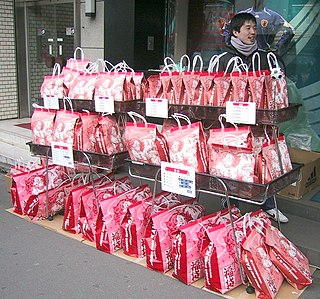
A convenience store, bodega, convenience shop, corner store or corner shop is a small retail store that stocks a range of everyday items such as tea, coffee, groceries, fruits, vegetables, snacks, confectionery, soft drinks, ice creams, tobacco products, lottery tickets, over-the-counter drugs, toiletries, newspapers and magazines. In some jurisdictions, convenience stores are licensed to sell alcoholic drinks, although many jurisdictions limit such beverages to those with relatively low alcohol content, like beer and wine. The stores may also offer money order and wire transfer services, along with the use of a fax machine or photocopier for a small per-copy cost. Some also sell tickets or recharge smart cards, e.g. OPUS cards in Montreal or include a small deli. They differ from general stores and village shops in that they are not in a rural location and are used as a convenient supplement to larger stores.

Amazon.com, Inc., doing business as Amazon, is an American multinational technology company focusing on e-commerce, cloud computing, online advertising, digital streaming, and artificial intelligence. It is considered one of the Big Five American technology companies; the other four are Alphabet, Apple, Meta, and Microsoft.
In marketing jargon, product lining refers to the offering of several related products for individual sale. Unlike product bundling, where several products are combined into one group, which is then offered for sale as a units, product lining involves offering the products for sale separately. A line can comprise related products of various sizes, types, colors, qualities, or prices. Line depth refers to the number of subcategories under a category. Line consistency refers to how closely related the products that make up the line are. Line vulnerability refers to the percentage of sales or profits that are derived from only a few products in the line.

Whole Foods Market, Inc., a subsidiary of Amazon, is an American multinational supermarket chain headquartered in Austin, Texas, which sells products free from hydrogenated fats and artificial colors, flavors, and preservatives. A USDA Certified Organic grocer in the United States, the chain is popularly known for its organic selections. As of March 4, 2019, Whole Foods has more than 500 stores in North America and seven in the United Kingdom.

Online shopping is a form of electronic commerce which allows consumers to directly buy goods or services from a seller over the Internet using a web browser or a mobile app. Consumers find a product of interest by visiting the website of the retailer directly or by searching among alternative vendors using a shopping search engine, which displays the same product's availability and pricing at different e-retailers. As of 2020, customers can shop online using a range of different computers and devices, including desktop computers, laptops, tablet computers and smartphones.
Amazon China, formerly known as Joyo.com, is an online shopping website. Joyo.com was founded in early 2000 by the Chinese entrepreneur Lei Jun in Beijing, China. The company primarily sold books and other media goods, shipping to customers nationwide. Joyo.com was renamed to “Amazon China” when sold to Amazon Inc in 2004 for US$75 Million. Amazon China closed its domestic business in China in June 2019, offering only products from sellers located overseas.
Fred Meyer is an American chain of hypermarket superstores founded in 1922 in Portland, Oregon, United States, by Fred G. Meyer. The stores are found in the northwest U.S., within the states of Oregon, Washington, Idaho, and Alaska. The company was acquired by Kroger in 1998, though the stores are still branded Fred Meyer. The chain was one of the first in the United States to promote one-stop shopping, eventually combining a complete grocery supermarket with a drugstore, bank, clothing, jewelry, home decor, home improvement, garden, electronics, restaurant, shoes, sporting goods, and toys. The Fred Meyer division is headquartered in Portland.

Self-checkouts (SCOs), also known as assisted checkouts (ACOs) or self-service checkouts, are machines that provide a mechanism for customers to complete their own transaction from a retailer without needing a traditional staffed checkout. When using SCOs, customers scan item barcodes before paying for their total shop without needing one-to-one staff assistance. Self-checkouts are used mainly in supermarkets, although they are not uncommon in department or convenience stores. Most self-checkout areas are supervised by at least one staff member, often assisting customers process transactions, correcting prices, or otherwise providing service.
Matt Rutledge is an American Internet entrepreneur, best known as the founder and former CEO of the daily deal site Woot. Woot was acquired by Amazon in 2010, and Rutledge resigned his position at Amazon in 2012. Rutledge launched a new daily-deal site, Meh, in 2014.

Fukubukuro is a Japanese New Year custom in which merchants make grab bags filled with unknown random contents and sell them for a substantial discount, usually 50% or more off the list price of the items contained within. The low prices are usually done to attract customers to shop at that store during the new year. The term is formed from fuku and fukuro, changing to bukuro for a phenomenon known as rendaku. The fuku comes from the Japanese saying that "there is fortune in leftovers". Popular stores' fukubukuro usually are snapped up quickly by eager customers, with some stores having long lines snake around city blocks hours before the store opens on New Year's Day.

Vera Bradley Sales, LLC is an American luggage and handbag design company, founded by Barbara Bradley Baekgaard and Patricia R. Miller in 1982. As of 2019, its home office is in Fort Wayne, Indiana. The company was named after Baekgaard's mother. Its original luxury cotton bag product lines have expanded to include fashion and home accessories, office supplies, and patterned gifts. Many items have distinctive florals, paisleys, or geometric prints with complementary linings, as well as elongated diamond quilting. The patterns were originally inspired by French Provençal country fabrics and have limited seasonal releases each year. In September 2022, the company named Jacqueline Ardrey as their new CEO.
Deal-of-the-day is an ecommerce business model in which a website offers a single product for sale for a period of 24 to 36 hours. Potential customers register as members of the deal-a-day websites and receive online offers and invitations by email or social networks.

A showbag is a themed bag of commercial products, novelty items and promotional merchandise, usually made available for purchase. It is a distinctive feature of Australian agricultural shows, where they are sold from stalls; they can also be found at exhibitions, festivals and fundraising events. Showbags are unique to Australia.
Tesco.com is an electronic commerce website operated by Tesco. It offers a wide range of other products, including electronic goods, books, broadband and financial services. Tesco closed their Tesco Direct website in 2018.

Longchamp is a French leather goods company, founded in Paris in 1948 by Jean Cassegrain. The company pioneered luxury leather-covered pipes before expanding into small leather goods. Longchamp debuted women's handbags in 1971, becoming one of France's leading leather goods makers. Today, the company designs and manufactures leather and canvas handbags, luggage, shoes, travel items, fashion accessories, and women's ready-to-wear. The house is privately owned and managed by the Cassegrain founding family and does business in 80 countries through around 1,500 retail outlets.

Amazon.com has been criticized, with questions raised about the ethics of the company's business practices and policies. Amazon has faced allegations of anti-competitive or monopolistic behavior and criticism of its treatment of workers and consumers. Concerns have been raised about the availability of products and services on Amazon platforms. In September 2023, the Federal Trade Commission filed a lawsuit against Amazon for using "a set of interlocking anticompetitive and unfair strategies".

Kate Spade New York is an American luxury fashion house founded in January 1993 by Kate and Andy Spade. In 2017, the company was purchased by Tapestry, Inc., formerly known as Coach, Inc.

Jet.com was an American e-commerce company headquartered in Hoboken, New Jersey. The company was co-founded in 2014 by Marc Lore, along with Mike Hanrahan and Nate Faust. Jet.com raised $820 million over four venture rounds from GV, Goldman Sachs, Bain Capital Ventures, Accel Partners, Alibaba Group, and Fidelity. The website was formally launched in July 2015. In September 2016, it became a subsidiary of Walmart.













